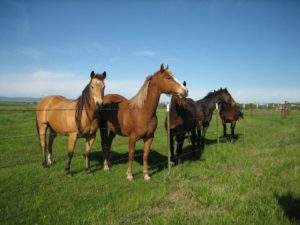Probiotics or direct-fed-microbials (DFM’s)  are living microorganisms typically bacteria or yeasts that when administered in adequate amounts, provide some benefit to the recipient. Typically they are beneficial bacteria that already exist in the digestive tract. Their use may be beneficial for horses displaying signs of digestive upset for example loose manure, inefficient ability to utilize the diet, after deworming, after antibiotics or at any time when intestinal microflora are thought to be compromised. Feeding them daily may help stabilize the hindgut microbial population and can be viewed as a good insurance policy versus waiting for disruption to occur. However, before deciding to purchase a probiotic it is worth understanding our present level of knowledge.
are living microorganisms typically bacteria or yeasts that when administered in adequate amounts, provide some benefit to the recipient. Typically they are beneficial bacteria that already exist in the digestive tract. Their use may be beneficial for horses displaying signs of digestive upset for example loose manure, inefficient ability to utilize the diet, after deworming, after antibiotics or at any time when intestinal microflora are thought to be compromised. Feeding them daily may help stabilize the hindgut microbial population and can be viewed as a good insurance policy versus waiting for disruption to occur. However, before deciding to purchase a probiotic it is worth understanding our present level of knowledge.
While there is much anecdotal evidence, currently there is not enough scientific evidence to conclude that probiotics are beneficial to horses or whether the correct strains of bacteria are being used. The number of organisms that would be necessary to be of benefit is likely to differ by the type of organism and has not been adequately investigated. Anecdotal evidence does suggest that probiotics may help some horses and if administered they are unlikely to be harmful. Classified by the FDA as a supplement and “generally regarded as safe” (GRAS), probiotics do not require any demonstration of efficacy and adverse effects are rarely reported. However, it may be wise to avoid Enterococci as they have been proven to transfer a gene responsible for antibiotic resistance, and probiotic use in foals should be avoided in the first 24 hours due to potentially reducing antibody absorption.
If you do decide to buy a probiotic, looking at the label can help insure that you are purchasing a quality product. The label should state the organisms that are included at least to the species level, for example Lactobacillus and better yet they should give the strain, for example Lactobacillus acidophilus, or Lactobacillus casei. The label should indicate the number of viable organisms (typically given as colony forming units or CFU) and ideally will guarantee that this number will still be viable at the expiration date. Live bacteria are not particularly stable and therefore products should be maintained in airtight containers and kept at a cool temperature.
Some products state that “fermentation products” of a certain bacteria are included or “yeast cultures”, this does not guarantee live bacteria are present and by definition if live microorganisms are not present it cannot be a probiotic. Rather these are prebiotics, substrates that are of benefit to existing intestinal tract bacteria. Other examples of common prebiotics include mannanoligosaccharides (MOS) and fructooligosacchrides (FOS).
Assuming that bacterial strains included in a product are beneficial, Dr. Scott Weese of the Ontario Veterinary College at the University of Guelph in Canada and an expert in probiotics estimates that the minimum number of CFU’s per dose should be at least 1 × 1010 CFU/d (10 billion viable organisms per day). Keep in mind that in one study performed by Dr Weese only 15 of 25 products studied provided expected bacterial numbers on the label, and only 4 of the 15 met or exceeded their label claims.
Personally I have had good experiences feeding probiotics and consider them for horses needing to gain weight, older horses whose digestive systems may not be as efficient and horses who are stressed for any reason. However I am cautious of using them for the very young, very weak or immune compromised as such individuals may be more susceptible to risks of infection and therefore I do not recommend probiotics without the owner seeking veterinary input first.
Given exciting research in human medicine showing probiotics being of benefit to patients suffering from asthma and immune disorders probiotic use for horses has much promise. However for now understand the limitations of our knowledge, be sure to read product labels and make product selections carefully. If you decide to try a probiotic with your horse, always discuss the idea with your veterinarian or qualified nutritionist.

Probiotics - to feed or not to feed? by Dr. Clair Thunes PhD is licensed under a Creative Commons Attribution-NoDerivatives 4.0 International License.
Based on a work at http://summit-equine.com/probiotics-to-…or-not-to-feed/